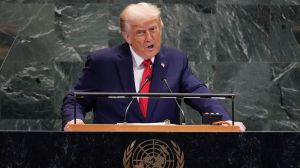Now Thermax chief speaks up: where’s governance in Gujarat?
Another voice, another conscience from India Inc has spoken up to condemn the Gujarat carnage. A deeply anguished Anu Aga, Thermax Limited C...

Another voice, another conscience from India Inc has spoken up to condemn the Gujarat carnage. A deeply anguished Anu Aga, Thermax Limited Chairperson and the CII’s Western Region Chairperson, has just returned from the state. ‘‘Where is our sense of values, decency and justice,’’ asks Aga, who had a heart-wrenching walk across relief camps in Ahmedabad. ‘‘They talk of corporate governance but where is the governance today?’’
| Anu Aga: ‘Punish the guilty’ |
Aga visited the Shah Alam and Bapu Nagar relief camps along with Dipankar Roy from CII Ahmedabad and an NGO representative. She and other CII members will meet on April 21 in Pune to discuss the events of Gujarat as well as the lessons that can be learnt for Pune, where many people have been justifying the violence. ‘‘The ingredients are all there, waiting for a spark to explode. If we don’t heal their wounds, these people will completely lose faith in India’s ability to protect them,’’ she told The Indian Express.
The industry could partner NGOs in physical and emotional rehabilitation, feels Aga.
‘‘First, we must condemn violence — against Hindus or Muslims — loudly and clearly. The law of the land must rule and we must punish guilty. Otherwise we may have to pay for the silence, like Germany did with the holocaust. It’s time we put pressure on the administrative and political systems in the country.’’ Aga also calls for an open debate on the bubbling anger and resentment that has built up between the two communities. ‘‘If in the past the minority has been pampered and given concessions, it needs to looked at afresh. If in the past practices went against the majority we need to have the guts to reverse them. Muslims will have to come out the clutches of fundamentalism. Let us have public debates on these issues. The answer is not violence and killing.’’
Aga says she expected to see seething faces and minds during her visit to the refugee camps; instead, she came away with images of helpless, vulnerable men, women and children. ‘‘The riots are a big blotch on the face of India,’’ she remarks. ‘‘Are we ostriches burying our heads in the sand? We frown upon inter-religious marriages but rape women; talk of vegetarianism and don’t even spare children. Such barbaric acts by a few destroy the country’s image. What’s more frightening is educated people justifying violence.’’
Aga remains optimistic that Gujarat’s famed resilience will see it through its latest crisis. She draws hope from bureaucrats and policemen who discharged their duties as best as they could though their hands were tied; from families of both communities who risked their lives to save others. She recounts her encounter with a Hindu NGO worker married to a Muslim, whose office was burnt and who was in danger of being assaulted when the Waghri community with whom she worked rescued her. Ostracised by her family, under pressure from the husband’s family to convert, she and her husband have held their ground.
Her husband has now encouraged her to work for the victims, which he felt was the best way to overcome the trauma. Aga hopes that similarly, everyone in Gujarat and elsewhere works to ‘‘deal with this insanity, reverse the hatred, retaliation and indiscriminate killing.’’
Photos



- 01
- 02
- 03
- 04
- 05




























